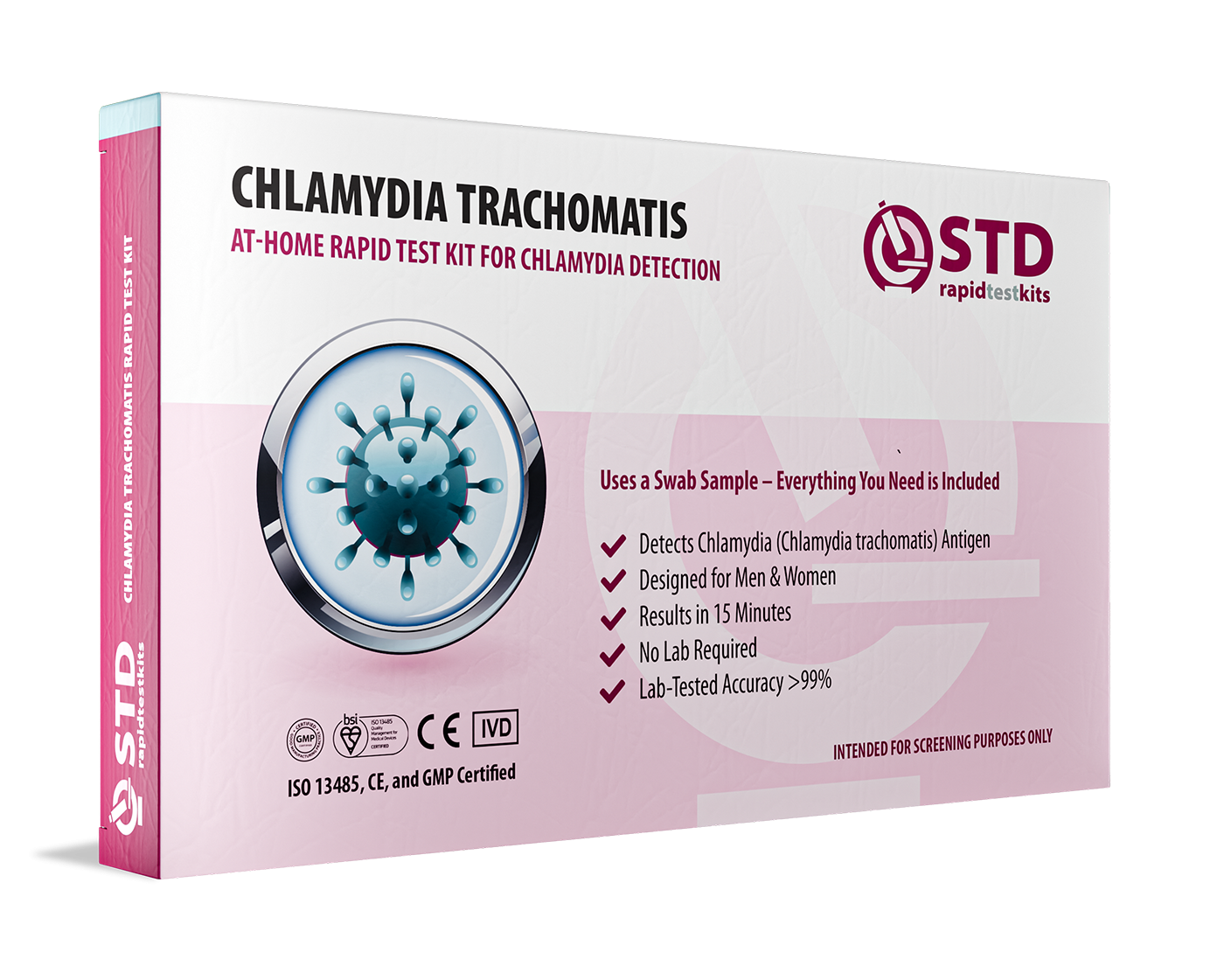Quick Answer: STD shame hits harder in small towns because of gossip, judgment, and limited healthcare access. At-home STD test kits offer discreet, private solutions for testing without risking exposure.
“I Was More Afraid of the Rumors Than the Results”
Ty, 26, didn’t think much of the sore on his lip. But when it didn’t go away, he panicked, not just about what it could be, but who might find out. “I didn’t even care if it was herpes,” he said. “I cared that if I walked into the clinic, the nurse might tell her cousin, and suddenly everyone at the gas station’s looking at me weird.”
“I wasn’t scared of the diagnosis. I was scared of my reputation dying in a town where I already didn’t fit in.”
Ty’s story isn’t rare. In rural and semi-rural communities, CDC data shows that STD rates are rising, often with less access to testing and more fear of social blowback. That combination leads many to delay care or avoid it entirely.

People are also looking for: Can you get trichomoniasis from oral sex?
Why STD Stigma Is Louder in Small Communities
In a city, anonymity is armor. But in towns where your neighbor is your pharmacist and your cousin works at the clinic, the risk of being seen, really seen, feels crushing. Add to that a conservative culture, religious judgment, or lack of sex ed, and shame can bloom in silence.
- Gossip Risk: Healthcare workers may be professional, but when lines blur between personal and public, trust suffers.
- Lack of Resources: Small towns often lack walk-in clinics, let alone sexual health specialists.
- Religious or Cultural Pressure: Virginity culture, slut-shaming, and purity narratives can make STDs feel like moral failures.
Even for teens and young adults, the fear of being “the one with herpes” or “the girl who gave someone chlamydia” can lead to denial, avoidance, or silence, even as symptoms worsen.
How Discretion Saves Lives (And Dignity)
This is where at-home STD test kits change the game. No awkward check-in. No running into your aunt in the clinic hallway. Just you, your test, and your truth, in private. These kits allow you to take control of your health without risking your reputation.
- Fast: Most results come in just a few days
- Private: No clinic visits or phone calls, results are emailed confidentially
- Doctor-Backed: Lab-certified, FDA-approved tests
Whether it’s a combo test kit or a targeted test for Chlamydia, testing from home removes the most intimidating barrier: being seen.
And when shame is your loudest symptom, privacy isn’t a luxury. It’s a lifeline.
When Silence Becomes a Symptom
STDs don’t just affect the body, they crawl into your thoughts, relationships, and sense of worth. In small towns where sex is whispered about, not spoken of, the emotional fallout of an STD can spiral into isolation, anxiety, or worse.
Lena, 34, was diagnosed with Chlamydia after months of ignoring painful urination. “I just kept hoping it was a UTI. I knew what it really was, but I couldn’t handle being the town’s latest dirty secret,” she confessed. She finally tested after finding an ad for home test kits while scrolling Reddit at midnight.
“Taking that test at home, it was the first time I felt safe enough to know the truth.”
Untreated Chlamydia can lead to pelvic inflammatory disease, infertility, and chronic pain. But Lena isn’t alone in waiting. Shame delays diagnosis. Silence delays safety.
Check Your STD Status in Minutes
Test at Home with RemediumChlamydia Test Kit

 For Men & Women
For Men & Women Results in Minutes
Results in Minutes No Lab Needed
No Lab Needed Private & Discreet
Private & DiscreetOrder Now $33.99 $49.00
STD Symptoms That People Downplay, Or Just Don’t Talk About
Many STDs are silent. Others show up with vague symptoms that get misattributed to things like heat rash, shaving, or allergies, especially when people are too embarrassed to ask.
In small towns, even Googling “STD symptoms” can feel like a risk if someone borrows your phone. Here’s what people often miss or ignore:
- Burning when peeing: Often dismissed as a UTI or dehydration
- Small bumps or sores: Confused with razor burn or ingrown hairs
- Itching or discharge: Attributed to yeast infections or hygiene
- No symptoms at all: Many cases of Gonorrhea and Chlamydia show no signs
If any of this sounds familiar, you're not dirty or broken. You're human. And you deserve clarity without the added burden of community judgment.
Access Is a Crisis, But It Doesn’t Have to Be
Even if someone overcomes the shame, they may still face another barrier: access. Rural clinics may be an hour away. Some don’t offer sexual health services at all. And in areas where the only open hours are weekdays 9–5? Forget it.
At-home STD testing isn’t just discreet, it’s accessible. It bridges the gap between fear and action, especially for:
- Teens and college students afraid to involve parents or use insurance
- Queer folks who’ve been dismissed or judged at local clinics
- Low-income patients without transportation or PTO to seek care
When you remove the fear of being seen, and the barrier of getting there, you increase the odds someone will actually follow through.
If you’re here, reading this, you probably need to know something. Don’t guess. Don’t spiral. Take the first step privately, on your terms, with a test you can trust.
“If I Tell Them, Will They Tell Everyone?”
One of the cruelest parts of having an STD in a small town isn’t the diagnosis, it’s the dread that comes with disclosure. You’re not just telling a partner. You’re potentially handing your story to the community grapevine.
Marcus, 29, was terrified to tell his girlfriend he had Herpes. “I didn’t want her to feel trapped. And I didn’t want her to tell her sister, who’d tell her pastor, who’d tell his wife. That’s how fast things spread here, faster than the virus.”
“I practiced what I’d say a hundred times, but I never practiced what I’d do if she told someone else.”
Disclosure is hard anywhere, but when reputation is currency, the stakes feel even higher. And yet, honest communication saves lives. It also stops STDs from spreading silently, something that happens all too often in shame-filled spaces.

Generational Shame: Why We Don’t Talk About This
Many of us were raised in homes where “sex” wasn’t dinner table conversation, let alone STDs. Add in church teachings about purity or social messaging about “clean” partners, and suddenly catching an infection becomes a perceived moral failure, not a medical event.
But here’s the truth:
- STDs don’t care about your values. You can get Herpes from oral sex. You can get HPV from one partner.
- You don’t need to sleep around. Many people contract an STD in monogamous relationships, often from a partner who didn’t know they were infected.
- Testing isn’t a confession. It’s an act of care, for yourself and others.
When communities cling to shame, they create the perfect storm for infections to thrive. Education, empathy, and access are how we break the cycle.
How to Talk About It (Even If You’re Scared)
If you’ve tested positive, whether through a clinic or an at-home test, the next step might be talking to a partner. Here’s how to start that conversation in a way that protects both of you:
- Be direct: “I care about you, and I want us to be safe. I tested positive for ___.”
- Stick to facts: Explain the risks, how it’s treated, and what it means for them
- Offer support: Share your testing process, and encourage them to test too
Remember: you are not your diagnosis. You are not a cautionary tale. You are a person who deserves love, safety, and honest relationships.
Healing Starts With Privacy, But It Doesn’t End There
Getting an STD diagnosis in a small town can feel like emotional exile. But healing isn’t just physical, it’s about rebuilding trust in your body, your community, and yourself. That starts with private, judgment-free care. It starts with a discreet home test that gives you answers before the rumor mill can invent them for you.
But once you’ve got your answers, the next phase begins: reclaiming your story. Whether you choose to tell no one, or you decide to educate others around you, your experience has value. You’re not just surviving stigma, you’re rewriting what safety and truth can look like in a world that still wants to whisper.
Check Your STD Status in Minutes
Test at Home with Remedium7-in-1 STD Test Kit

 For Men & Women
For Men & Women Results in Minutes
Results in Minutes No Lab Needed
No Lab Needed Private & Discreet
Private & DiscreetOrder Now $129.00 $343.00
For all 7 tests
Don’t Wait for a Symptom to Show Up (Or for Someone Else to Tell Your Story)
Most STDs don’t come with neon signs. They don’t always burn, itch, or ooze. Sometimes they just linger quietly, until they cause permanent damage, or get passed on to someone else. If you’ve had unprotected sex, or even protected sex with new partners, testing isn’t paranoia. It’s self-respect.
If the thought of walking into a clinic has kept you in the dark, here’s your light: 6-in-1 STD At-Home Rapid Test Kit. It screens for the most common infections, Herpes, Chlamydia, Gonorrhea, Syphilis, and more, from the privacy of your own home.
Don’t wait until a symptom forces your hand. Don’t let fear write your health story. Get the facts. Get tested. Do it your way.
FAQs
1. Is it really possible to get an STD while in a monogamous relationship?
Yes. A lot of people get STDs from partners who don't know they have them. Being monogamous doesn't protect you if the other person hasn't been tested in a while.
2. How can I tell if I have an STD if I don't have any symptoms?
You don't know unless you get tested. Some STDs, like Chlamydia and Gonorrhea, can stay hidden for months or even years.
3. Is it safe to use an STD test kit at home?
Yes, for sure. The STD Rapid Test Kits are an example of a reputable kit that has been tested in a lab and approved by the FDA for accuracy and privacy.
4. What if someone looks at my mail?
Your privacy is completely protected because at-home STD test kits come in plain boxes with no medical labels or branding.
5. Is it possible to get tested without my insurance?
Yes. You don't need insurance to buy at-home test kits. You pay for them directly, with no paperwork, no visit to a provider, and no explanation needed.
6. How long does it take to get the results of an STD test?
Most results come back between 2 and 5 days, depending on the test type and where it was done.
7. Is it possible to get an STD from oral sex?
Yes. Oral sex can spread herpes, gonorrhea, and even syphilis, even if you don't have any symptoms.
8. How do I tell my partner that I have an STD?
Be honest, use simple words, and talk about care and responsibility. You don't have to share all the details, just the facts and a plan for the future.
9. What is the best way to get tested without drawing attention to yourself?
The most private way to test for STDs is with an at-home kit. You don't have to go to a clinic, fill out any paperwork, and the results are sent straight to you.
10. What makes STD stigma worse in small towns?
Gossip spreads quickly in small towns, there aren't as many healthcare options, and moral judgment can seem louder. In that setting, it's harder to get tested or get care without being afraid of being seen.
You Deserve Answers, Not Assumptions
If you've ever hesitated to seek care because of what people might say, this article is for you. STDs are infections, not indictments. And your right to privacy, safety, and healing should never depend on your zip code or who your neighbor knows.
Whether you’re scared, curious, or just tired of wondering, you can take the first step today, privately, from your own space. You don’t owe anyone your story. But you do owe yourself the truth.
Sources
1. Improving Sexual Health in U.S. Rural Communities – Valentine et al., 2021
2. STI Epidemiology and Care in Rural Areas: A Narrative Review
3. Shame and STIs: An Exploration of Emerging Adult Experiences – Scheinfeld et al., 2021
4. STI-Related Stigma and Shame Undermining Testing and Treatment – Morris et al., 2014
5. Mental Health Stigma in Rural Communities – Rural Health Info Hub
6. STIs on the Rise in Rural America: Screening Disparities – JournalistsResource.org










